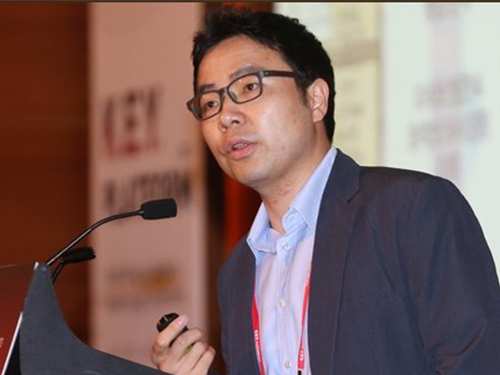Young+Jae+Jang
-
 KAIST and Google Partner to Develop AI Curriculum
Two KAIST professors, Hyun Wook Ka from the School of Transdisciplinary Studies and Young Jae Jang from the Department of Industrial and Systems Engineering, were recipients of Google Education Grants that will support the development of new AI courses integrating the latest industrial technology. This collaboration is part of the KAIST-Google Partnership, which was established in July 2019 with the goal of nurturing AI talent at KAIST.
The two proposals -- Professor Ka’s ‘Cloud AI-Empowered Multimodal Data Analysis for Human Affect Detection and Recognition’ and Professor Jang’s ‘Learning Smart Factory with AI’-- were selected by the KAIST Graduate School of AI through a school-wide competition held in July. The proposals then went through a final review by Google and were accepted. The two professors will receive $7,500 each for developing AI courses using Google technology for one year.
Professor Ka’s curriculum aims to provide a rich learning experience for students by providing basic knowledge on data science and AI and helping them obtain better problem solving and application skills using practical and interdisciplinary data science and AI technology.
Professor Jang’s curriculum is designed to solve real-world manufacturing problems using AI and it will be field-oriented. Professor Jang has been managing three industry-academic collaboration centers in manufacturing and smart factories within KAIST and plans to develop his courses to go beyond theory and be centered on case studies for solving real-world manufacturing problems using AI.
Professor Jang said, “Data is at the core of smart factories and AI education, but there is often not enough of it for the education to be effective. The KAIST Advanced Manufacturing Laboratory has a testbed for directly acquiring data generated from real semiconductor automation equipment, analyzing it, and applying algorithms, which enables truly effective smart factory and AI education.”
KAIST signed a partnership with Google in July 2019 to foster global AI talent and is operating various programs to train AI experts and support excellent AI research for two years.
The Google AI Focused Research Award supports world-class faculty performing cutting-edge research and was previously awarded to professors Sung Ju Hwang from the Graduate School of AI and Steven Whang from the School of Electrical Engineering along with Google Cloud Platform (GCP) credits. These two professors have been collaborating with Google teams since October 2018 and recently extended their projects to continue through 2021.
In addition, a Google Ph.D. Fellowship was awarded to Taesik Gong from the School of Computing in October this year, and three Student Travel Grants were awarded to Sejun Park from the School of Electrical Engineering, Chulhyung Lee from the Department of Mathematical Sciences, and Sangyun Lee from the School of Computing earlier in March. Five students were also recommended for the Google Internship program in March.
(END)
2020.12.11 View 14092
KAIST and Google Partner to Develop AI Curriculum
Two KAIST professors, Hyun Wook Ka from the School of Transdisciplinary Studies and Young Jae Jang from the Department of Industrial and Systems Engineering, were recipients of Google Education Grants that will support the development of new AI courses integrating the latest industrial technology. This collaboration is part of the KAIST-Google Partnership, which was established in July 2019 with the goal of nurturing AI talent at KAIST.
The two proposals -- Professor Ka’s ‘Cloud AI-Empowered Multimodal Data Analysis for Human Affect Detection and Recognition’ and Professor Jang’s ‘Learning Smart Factory with AI’-- were selected by the KAIST Graduate School of AI through a school-wide competition held in July. The proposals then went through a final review by Google and were accepted. The two professors will receive $7,500 each for developing AI courses using Google technology for one year.
Professor Ka’s curriculum aims to provide a rich learning experience for students by providing basic knowledge on data science and AI and helping them obtain better problem solving and application skills using practical and interdisciplinary data science and AI technology.
Professor Jang’s curriculum is designed to solve real-world manufacturing problems using AI and it will be field-oriented. Professor Jang has been managing three industry-academic collaboration centers in manufacturing and smart factories within KAIST and plans to develop his courses to go beyond theory and be centered on case studies for solving real-world manufacturing problems using AI.
Professor Jang said, “Data is at the core of smart factories and AI education, but there is often not enough of it for the education to be effective. The KAIST Advanced Manufacturing Laboratory has a testbed for directly acquiring data generated from real semiconductor automation equipment, analyzing it, and applying algorithms, which enables truly effective smart factory and AI education.”
KAIST signed a partnership with Google in July 2019 to foster global AI talent and is operating various programs to train AI experts and support excellent AI research for two years.
The Google AI Focused Research Award supports world-class faculty performing cutting-edge research and was previously awarded to professors Sung Ju Hwang from the Graduate School of AI and Steven Whang from the School of Electrical Engineering along with Google Cloud Platform (GCP) credits. These two professors have been collaborating with Google teams since October 2018 and recently extended their projects to continue through 2021.
In addition, a Google Ph.D. Fellowship was awarded to Taesik Gong from the School of Computing in October this year, and three Student Travel Grants were awarded to Sejun Park from the School of Electrical Engineering, Chulhyung Lee from the Department of Mathematical Sciences, and Sangyun Lee from the School of Computing earlier in March. Five students were also recommended for the Google Internship program in March.
(END)
2020.12.11 View 14092 -
 Professor Young Jae Jang Receives the Grant Award from Mathworks
Professor Young Jae Jang of KAIST’s Industrial and Systems Engineering Department won the Grant Award from Mathworks, Inc., an American developer of mathematical computing software. Headquartered in Massachusetts in the United States, Mathworks has been known for its MATLAB software that is used by many engineers and scientists around the world for algorithm development, data analysis, visualization, and numeric computation.
Winners of the Grant Award are selected from proposals submitted by educational institutions in 18 different countries based on their innovative lab curricula and future potential for innovation and creativity.
Award winners receive a cash grant of up to USD 40,000 as well as various other forms of support including software and technical guidance for creating a course.
Professor Jang has researched combining the concept of industrial engineering education with Lego principles since 2014. He developed Lego-based experimental equipment and utilized it to teach students about difficult ideas, for example, big data and manufacturing technologies needed for Industry 4.0, such as automation, cyber-physical systems, the Internet of Things, and cloud computing. He created an innovative teaching environment where students learn engineering concepts and then conduct experiments on their own to understand the new paradigm of industrial systems.
Lego-based education allows students to personalize their learning process, shifting lecture-centered approaches toward learner-oriented approaches. Students apply theories to operate tools and equipment made with Lego, identify problems, and find solutions. In such processes, they can understand the content of their study more easily and efficiently and become more motivated.
Professor Jang’s research has attracted a great deal of interest overseas, and he is frequently invited to international conferences as a keynote speaker.
Picture: Lego-based Learning Model of Experiment Equipment Developed by Professor Young Jae Jang
2016.12.08 View 7028
Professor Young Jae Jang Receives the Grant Award from Mathworks
Professor Young Jae Jang of KAIST’s Industrial and Systems Engineering Department won the Grant Award from Mathworks, Inc., an American developer of mathematical computing software. Headquartered in Massachusetts in the United States, Mathworks has been known for its MATLAB software that is used by many engineers and scientists around the world for algorithm development, data analysis, visualization, and numeric computation.
Winners of the Grant Award are selected from proposals submitted by educational institutions in 18 different countries based on their innovative lab curricula and future potential for innovation and creativity.
Award winners receive a cash grant of up to USD 40,000 as well as various other forms of support including software and technical guidance for creating a course.
Professor Jang has researched combining the concept of industrial engineering education with Lego principles since 2014. He developed Lego-based experimental equipment and utilized it to teach students about difficult ideas, for example, big data and manufacturing technologies needed for Industry 4.0, such as automation, cyber-physical systems, the Internet of Things, and cloud computing. He created an innovative teaching environment where students learn engineering concepts and then conduct experiments on their own to understand the new paradigm of industrial systems.
Lego-based education allows students to personalize their learning process, shifting lecture-centered approaches toward learner-oriented approaches. Students apply theories to operate tools and equipment made with Lego, identify problems, and find solutions. In such processes, they can understand the content of their study more easily and efficiently and become more motivated.
Professor Jang’s research has attracted a great deal of interest overseas, and he is frequently invited to international conferences as a keynote speaker.
Picture: Lego-based Learning Model of Experiment Equipment Developed by Professor Young Jae Jang
2016.12.08 View 7028